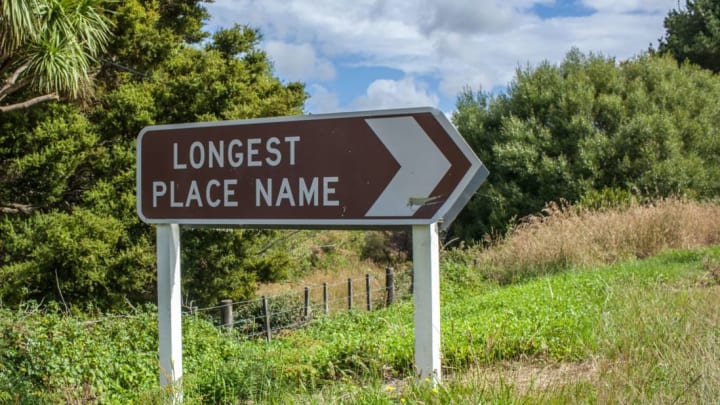Single-letter place names can make writing an address pretty quick and easy. But what about those at the opposite end of the character scale? Here's a look at the 10 longest place names in the world, and the origins of these unusually lengthy words.
1. Taumatawhakatangihangakoauauotamateapokaiwhenuakitanatahu // New Zealand

The longest place name in the world is 85 letters long and refers to a hill on New Zealand’s North Island named after a famous local legend. Taumatawhakatangihangakoauauotamateapokaiwhenuakitanatahu is a Māori expression that translates to “the place where Tamatea, the man with the big knees, who slid, climbed and swallowed mountains, known as 'landeater,’ played his flute to his loved one.” Tamatea was the name of a legendary New Zealand warrior, and the music he played was to mourn the loss of his brother in battle. Taumata is also a traditional Māori term for a hill or summit.
2. Llanfairpwllgwyngyllgogerychwyrndrobwllllantysiliogogogoch // Wales
The second longest place name in the world clocks in at 58 letters. You’ll find the village of Llanfairpwllgwyngyllgogerychwyrndrobwllllantysiliogogogoch on the island of Ynys Môn (known as Anglesey in English), off the coast of Wales. Its name translates to “St. Mary’s Church in the hollow of the white hazel near a rapid whirlpool and the Church of Saint Tysilio of the red cave.” The village’s original name was Llanfair Pwllgwyngyll; it was lengthened in the 1860s in an attempt to attract more tourists to the area. The official website for the village also claims to be the longest URL in the world. You can watch a weatherman breeze through the town's pronunciation here.
3. Chargoggagoggmanchauggagoggchaubunagungamaugg // Massachusetts

The longest place name in the United States belongs to a lake in Webster, Massachusetts. Locals take great pride in the lake’s 45-letter moniker—in fact, an attempt to change it in the 1950s was successfully defeated. Chargoggagoggmanchauggagoggchaubunagungamaugg is a Nipmuc expression; the language belongs to the indigenous Nipmuc people of what is now Massachusetts. Despite popular lore, it doesn't mean “You fish on your side, I fish on my side, and nobody fishes in the middle” (that story was made up by a reporter in the 1920s). The lake got its name after the arrival of colonists from England, and it translates to “English knifemen and Nipmuck Indians at the boundary or neutral fishing place.”
4. Tweebuffelsmeteenskootmorsdoodgeskietfontein // South Africa
In the North West Province of South Africa, you’ll find a farm called Tweebuffelsmeteenskootmorsdoodgeskietfontein, an Afrikaans name that means “The spring where two buffaloes were cleanly killed with a single shot.” (The name also inspired the title of a song by the South African musician Anton Goosen.) The Afrikaans language has produced a number of other lengthy words, the longest being 136 letters: Tweedehandsemotorverkoopsmannevakbondstakingsvergaderingsameroeperstoespraakskrywerspersverklaringuitreikingsmediakonferensieaankondiging (“issuable media conference’s announcement at a press release regarding the convener’s speech at a second hand car dealership union’s strike meeting.”
5. Azpilicuetagaraycosaroyarenberecolarrea // Spain
The Basque language (also known as Euskara) is the oldest language in Europe. It’s also a linguistic mystery: Basque has no known relationship to any other language, and linguists have been unable to trace its origins. It has therefore become known as a “language isolate.” Basque has also produced another one of the longest place names in the world: Azpilicuetagaraycosaroyarenberecolarrea, the name of a village in the Navarra region of Spain. It's 39 letters long, and in English the name reads as “The low field of high pen of Azpilkueta.”
6. Äteritsiputeritsipuolilautatsijänkä // Finland
The Savukoski area of Lapland, Finland, is one of the most remote areas of wilderness in the country—there are 10 times more reindeer living there than humans. It's here you'll find a bog called Äteritsiputeritsipuolilautatsijänkä. The origin of the 35-letter name, and its meaning, are unclear. A bar in the region was later given the same name. It made for an interesting pub sign, but the establishment closed in 2006.
7. Pekwachnamaykoskwaskwaypinwanik // Canada
In recent years, there has been a push in the Manitoba region of Canada to record the area’s original indigenous names and rematch them with subsequently renamed locations. The influence of the Cree language can be seen in the name of a lake in the region: Pekwachnamaykoskwaskwaypinwanik, the longest place name in Canada. The lake in question is a popular location for trout fishing; this is reflected in its 31-letter name, a Cree expression that means “where the wild trout are caught by fishing with hooks.”
8. Venkatanarasimharajuvaripeta // India
Venkatanarasimharajuvaripeta (translation: “Venkatanarasimharaju's City”) is a railway station in the state of Andhra Pradesh in India. The 28-letter-long name is a Telugu expression, the language spoken throughout the state. It's sometimes extended to 31 letters, as local people often refer to the station as Srivenkatanarasimharajuvaripeta. While it is the longest single word name railway station in India, the longest name involving multiple words is Puratchi Thalaivar Dr. M.G. Ramachandran Central Railway Station located in Tamil Nadu.
9. Bovenendvankeelafsnysleegte // South Africa
The Karoo, a desert region in South Africa, is a vast area that covers a section of the country equivalent to the whole of Germany. A farm in this region holds the title of the ninth longest place name in the world. It’s located 3028 feet (923 meters) above sea level, and its 27-letter name is an Afrikaans expression that translates to “upper end of throat-cut valley.”
10. Mamungkukumpurangkuntjunya // Australia
The tenth longest name on the list is also the longest single place name in Australia. Mamungkukumpurangkuntjunya is a hill in Southern Australia’s Antara-Sandy Bore Indigenous Protected Area. The 26-letter name translates to “where the devil urinates” and comes from the Aboriginal language of Pitjantjatjara, which is spoken in the region by the Pitjantjatjara people (who also describe themselves as the Aṉangu).
